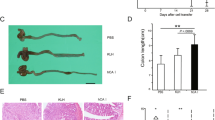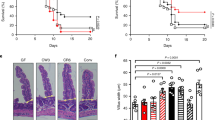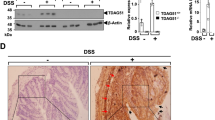Abstract
The transfer of genes encoding immunomodulatory proteins to the intestinal mucosa is a promising new approach to the treatment of Crohn's disease (CD). This study investigates the therapeutic efficacy of an adenoviral vector encoding IL-10 (AdvmuIL-10) in experimental colitis. BALB/c mice were treated with a single intravenous injection of AdvmuIL-10, empty cassette virus (Adv0) or PBS prior to the induction of trinitrobenzene sulphonic acid (TNBS) colitis. AdvmuIL-10 treatment prevented the severe loss of body weight associated with TNBS administration. In addition, AdvmuIL-10 therapy led to a significant reduction in both stool markers of inflammation (IL-1β and TNFR-II) and acute phase response (serum amyloid protein). Finally, the histological scores of mice with TNBS colitis treated with AdvmuIL-10 were significantly lower than Adv0- or PBS-treated controls. The therapeutic efficacy of AdvmuIL-10 was associated with a decrease in the IFN-γ and IL-6 levels detected in colonic homogenates from mice with TNBS colitis, whereas no effect was observed on cytokine release from stimulated systemic lymphocytes. Thus, AdvmuIL-10 is an effective therapy in the TNBS model of colitis. Gene therapy strategies using adenoviral vectors encoding IL-10 may prove to be a potent therapy for chronic inflammatory conditions such as CD.
This is a preview of subscription content, access via your institution
Access options
Subscribe to this journal
Receive 12 print issues and online access
$259.00 per year
only $21.58 per issue
Buy this article
- Purchase on Springer Link
- Instant access to full article PDF
Prices may be subject to local taxes which are calculated during checkout






Similar content being viewed by others
References
Berg DJ et al. Enterocolitis and colon cancer in interleukin-10-deficient mice are associated with aberrant cytokine production and CD4+ Th1-like responses J Clin Invest 1996 98: 1010–1020
Spencer SD et al. The orphan receptor CRF2-4 is an essential subunit of the interleukin 10 receptor J Exp Med 1998 187: 571–578
Buelens C et al. Human dendritic cell responses to lipopolysaccharide and CD40 ligation are differentially regulated by interleukin-10 Eur J Immunol 1997 27: 1848–1852
Moore KW, de Waal Malefyt R, Coffman RL, O'Garra A . Interleukin-10 and the interleukin-10 receptor Annu Rev Immunol 2001 19: 683–765
Groux H et al. A CD4+ T-cell subset inhibits antigen-specific T-cell responses and prevents colitis Nature 1997 389: 737–742
Asseman C et al. An essential role for interleukin 10 in the function of regulatory T cells that inhibit intestinal inflammation J Exp Med 1999 190: 995–1004
Davidson NJ et al. Chronic colitis in IL-10−/− mice: insufficient counter regulation of a Th1 response Int Rev Immunol 2000 19: 91–121
Fuss IJ, Boirivant M, Lacy B, Strober W . The interrelated roles of TGF-β and IL-10 in the regulation of experimental colitis J Immunol 2002 168: 900–908
Powrie F et al. Inhibition of Th1 responses prevents inflammatory bowel disease in scid mice reconstituted with CD45RBhi CD4+ T cells Immunity 1994 1: 553–562
Herfarth HH, Böcker U, Janardhanam R, Sartor RB . Subtherapeutic corticosteroids potentiate the ability of interleukin 10 to prevent chronic inflammation in rats Gastroenterology 1998 115: 856–865
Fedorak RN et al. Recombinant human interleukin 10 in the treatment of patients with mild to moderately active Crohn's disease Gastroenterology 2000 119: 1473–1482
Schreiber S et al. Safety and efficacy of recombinant human interleukin 10 in chronic active Crohn's disease Gastroenterology 2000 119: 1461–1472
Colombel JF et al. Interleukin 10 (Tenovil) in the prevention of postoperative recurrence of Crohn's disease Gut 2001 49: 42–46
Chernoff AE et al. A randomized, controlled trial of IL-10 in humans. Inhibition of inflammatory cytokine production and immune responses J Immunol 1995 154: 5492–5499
Tilg H et al. Treatment of Crohn's disease with recombinant human interleukin 10 induces the proinflammatory cytokine interfeon γ Gut 2002 50: 191–195
Steidler L et al. Treatment of murine colitis by Lactococcus lactis secreting interleukin-10 Science 2000 289: 1352–1355
Cheng DY, Kolls JK, Lei D, Noel RA . In vivo and in vitro gene transfer and expression in rat intestinal epithelial cells by E1-deleted adenoviral vector Hum Gene Ther 1997 8: 755–764
Wirtz S, Galle PR, Neurath MF . Efficient gene delivery to the inflamed colon by local administration of recombinant adenoviruses with normal or modified fibre structure Gut 1999 44: 800–807
Foreman PK et al. Adenovirus-mediated transduction of intestinal cells in vivo Hum Gene Ther 1998 9: 1313–1321
Kim KN et al. Viral IL-10 and soluble TNF receptor act synergistically to inhibit collagen-induced arthritis following adenovirus-mediated gene transfer J Immunol 2000 164: 1576–1581
Whalen JD et al. Adenoviral transfer of the viral IL-10 gene periarticularly to mouse paws suppresses development of collagen-induced arthritis in both injected and uninjected paws J Immunol 1999 162: 3625–3632
Apparailly F et al. Adenovirus-mediated transfer of viral IL-10 gene inhibits murine collagen-induced arthritis J Immunol 1998 160: 5213–5220
Lindsay JO et al. The prevention and treatment of murine colitis using gene therapy with adenoviral vectors encoding IL-10 J Immunol 2001 166: 7625–7633
Ribbons KA et al. Anti-inflammatory properties of interleukin-10 administration in hapten-induced colitis Eur J Pharmacol 1997 323: 245–254
Neurath MF et al. Effects of IL-12 and antibodies to IL-12 on established granulomatous colitis in mice Ann N Y Acad Sci 1996 795: 368–370
Ten Hove T et al. Blockade of endogenous IL-18 ameliorates TNBS-induced colitis by decreasing local TNF-alpha production in mice Gastroenterology 2001 121: 1372–1379
Saiki T et al. Detection of pro- and anti-inflammatory cytokines in stools of patients with inflammatory bowel disease Scand J Gastroenterol 1998 33: 616–622
Camoglio L et al. Hapten-induced colitis associated with maintained Th1 and inflammatory responses in IFN-gamma receptor-deficient mice Eur J Immunol 2000 30: 1486–1495
Schnell MA et al. Activation of innate immunity in nonhuman primates following intraportal administration of adenoviral vectors Mol Ther 2001 5: 708–722
Qin L et al. Adenovirus-mediated gene transfer of viral interleukin-10 inhibits the immune response to both alloantigen and adenoviral antigen Hum Gene Ther 1997 8: 1365–1374
Minter RM et al. TNF-alpha receptor signaling and IL-10 gene therapy regulate the innate and humoral immune responses to recombinant adenovirus in the lung J Immunol 2000 164: 443–451
Duchmann R et al. Tolerance towards resident intestinal flora in mice is abrogated in experimental colitis and restored by treatment with interleukin-10 or antibodies to interleukin-12 Eur J Immunol 1996 26: 934–938
Barbara G et al. Interleukin 10 gene transfer prevents experimental colitis in rats Gut 2000 46: 344–349
Ajuebor MN et al. The chemokine RANTES is a crucial mediator of the progression from acute to chronic colitis in the rat J Immunol 2001 166: 552–558
Wirtz S et al. Treatment of T cell-dependent experimental colitis in SCID mice by local administration of an adenovirus expressing IL-18 antisense mRNA J Immunol 2002 168: 411–420
Croyle MA, Stone M, Amidon GL, Roessler BJ . In vitro and in vivo assessment of adenovirus 41 as a vector for gene delivery to the intestine Gene Ther 1998 5: 645–654
Graham FL, Prevec L . Methods for construction of adenovirus vectors Mol Biotechnol 1995 3: 207–220
Acknowledgements
We thank Joost Daalhuizen and Ingvild Kop for biotechnical assistance, and Professor FJW ten Kate for careful reading of the manuscript.
Author information
Authors and Affiliations
Rights and permissions
About this article
Cite this article
Lindsay, J., van Montfrans, C., Brennan, F. et al. IL-10 gene therapy prevents TNBS-induced colitis. Gene Ther 9, 1715–1721 (2002). https://doi.org/10.1038/sj.gt.3301841
Received:
Accepted:
Published:
Issue Date:
DOI: https://doi.org/10.1038/sj.gt.3301841
Keywords
This article is cited by
-
microRNAs as therapeutic targets in intestinal diseases
ExRNA (2019)
-
Function of the glycosyltransferase GnT-V in colitis
Journal of Gastroenterology (2016)
-
Targeting the gastrointestinal tract with viral vectors: state of the art and possible applications in research and therapy
Histochemistry and Cell Biology (2016)
-
Serine protease inhibitors protect better than IL-10 and TGF-β anti-inflammatory cytokines against mouse colitis when delivered by recombinant lactococci
Microbial Cell Factories (2015)
-
Mucosal gene therapy using a pseudotyped lentivirus vector encoding murine interleukin-10 (mIL-10) suppresses the development and relapse of experimental murine colitis
BMC Gastroenterology (2014)



